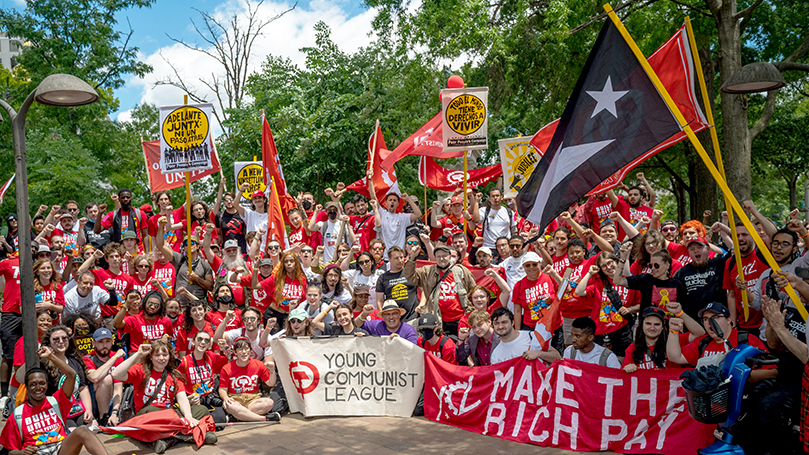
On the CPUSA’s visible “existence” in national life
Before I joined the CPUSA in the spring of 2017, I had no idea that the Communist Party of the United States still existed. As someone new to the movement at the time, being only exposed to the Black Lives Matter movement following the murders of Trayvon Martin, Eric Garner, Alton Sterling, Michael Brown, and others, as well as the Occupy Wall Street movement and 2016 campaign of Bernie Sanders in the Democratic primary, I began to make the links between the movement for Black liberation and the class struggle for socialism—concluding that more fundamental changes were needed than the reforms advocated by the Sanders campaign.
Given my own ignorance of the Communist Party’s existence, I am sure many unconscious workers and people within the mass democratic movements fighting against police violence, for abortion rights, and for other progressive causes, are unaware of our party’s existence, let alone its history.
Some may be aware of the current growth and youth energy in the Democratic Socialists of America (DSA). Others may think that the hey-day of the CPUSA was in the 1930s and 1940s, but that the Communist Party is currently irrelevant or nonexistent.
Many new members within the party have questions about our approach to elections, wondering why we haven’t run an independent national candidate since 1984 for president and vice president. A number of them are still very confused about our popular front approach, which includes our concept of the “Communist plus”—what we add to the movement through our work in trade unions and other mass organizations.
Alongside these questions about the role of the party, there are questions about its legal status. Are we a semi-legal political party or a fully legal party? Which McCarthyite-era laws still affect our ability to work openly? How do we struggle for ballot access and participate publicly in legislative affairs? How do we become a mass party representing the working class of this country, capable of widely affecting public consciousness? How do we build morale and overcome the internalized fear and Red-baiting that disarms us within the trade unions, within the democratic movement, and within the electoral process?
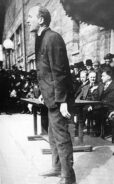 William Z Foster addresses some of these questions in Our Country Needs a Strong Communist Party.
William Z Foster addresses some of these questions in Our Country Needs a Strong Communist Party.
“A major necessity for building our Party into the mass Party that we must have is to secure its full legalization,” he wrote. “As matters stand now, our Party is only partially legal. In various areas of our political life, the Communist Party is barely tolerated, if at all. We are denied many legal rights of other parties by the Government—Federal, State, and City—we are not fully recognized in the ranks of the democratic coalition, and we are also discriminated against in the trade unions.”
Foster wrote this after the reinstatement of the CPUSA in 1946, which had been temporarily liquidated into the Communist Political Association in 1944 under the leadership of Earl Browder. Foster was trying to bring back the fighting spirit of the party in the aftermath of the war and liquidation. This would eventually be halted by the Dies Committee and HUAC attacks on the party several years later and eventually the Smith, Taft-Hartley, and Walter-McCarran Acts, which targeted the CPUSA for repression, restricting the democratic and trade union movements in the process.
“We must struggle for our full legality to have a more favorable terrain to fight on.”
In light of the socialist moment, our party needs to build into an influential mass party in order to sustain and maintain its growth. In light of a growing fascist danger, we must struggle for our full legality to have a more favorable terrain to fight on.
Struggling for our full legality includes: 1) fighting for ballot access, 2) running Communist candidates, 3) fighting for our open Communist leadership within mass organizations, which would include Communist speakers at mass mobilizations, 4) openly fighting for legislation through public hearings in Congress and local city councils, and 5) fighting on legal grounds against anti-Communist legislation that affects our work nationally and locally.
As Foster wrote in 1946, “We must legalize ourselves in legislative assemblies by appearing and testifying upon all important legislation, and by electing Communists to office. In the various movements and activities of the democratic coalition we must let the timid or Red-baiting leaders know that the Communists are not going to remain in the background and do the bulk of the work and get none of the credit, but are going to insist upon recognition for what they are––front-line fighters in every battle for democracy. In the trade unions we must insist upon our full democratic rights. Red-baiting must be defeated. Not only in the interests of our Party but of the whole nation, demand it. The Communist Party must be legalized in every sense of the word.”
We have to have enough influence that the working class and the nationally oppressed know we are fighting for their interest, not that of the ruling capitalist class like the Democratic and Republican Parties do. The Communist Party needs to become part of the national life of the country, with mass influence in all social, political, and economic spheres of U.S. life. We need to struggle for representation and leadership in city councils, school boards, mayoral offices, public library boards, museum boards, academic boards, trade union caucuses, neighborhood committees, tenant associations—in every social institution we can think of.
By building mass support around local bases in the neighborhoods, shop floors, and campuses, each party district can create the political pressure needed to fight for necessary reforms in their communities, universities, and workplaces. This in turn could lead to legislative fights for party-led ballot initiatives and city council resolutions, all while training the next generation of a fighting party leadership.
Comrades in the party (old and new) need to develop a mass approach throughout each district. Every section of potential influence should be studied and looked at. The party needs to be visible and influential in everyday life. Simple things like writing an opinion column or letter to the editor of a local newspaper can be a start.
Clubs should be taking up front line positions in the fight against racism by building mass organizations in their communities, like a branch of the National Alliance Against Racist and Political Repression (NAARPR). They should be playing a leading role in the battle of ideas against monopoly and reaction by building working-class institutions, e.g., Marxist and popular education schools or workers’ centers to help those in need. Examples of this idea include the Claudia Jones School for Political Education in Washington, DC, and the People’s Center in New Haven, CT. Clubs should be building infrastructure locally, so they can be visible in their communities—purchasing a community building, renting an office space, hiring an organizer, developing a People’s World paper route in a community, or developing multimedia for educational purposes and journalistic efforts.
Playing an active, visible, and independent role throughout the country
CPUSA members need to stop comparing ourselves to other third parties in this country. We are not the Green Party, we are not the variety of Trotskyite parties, we are not the Working Families Party. Locally, we should be thinking about our relationship to these parties, but fully understand our independence as a Communist Party.
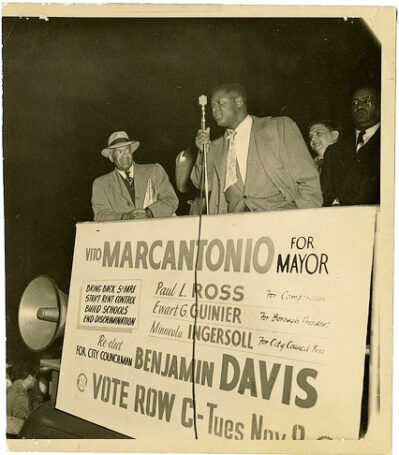 When Peter Cacchione won a seat on the New York City Council in 1941 on the Communist ticket, that was the work of the party-led mass movement. When Ben Davis, Jr., won another seat on the NYC Council a few years later on the American Labor Party ticket, this was a result of the CPUSA’s influence among the barrios in Harlem and in the Black and Jewish communities. These electoral victories served as precursor developments to Henry Wallace’s campaign for President of the U.S. on the Progressive Party ticket, which enjoyed the full support of the CPUSA. How do we reproduce this type of work in our local communities?
When Peter Cacchione won a seat on the New York City Council in 1941 on the Communist ticket, that was the work of the party-led mass movement. When Ben Davis, Jr., won another seat on the NYC Council a few years later on the American Labor Party ticket, this was a result of the CPUSA’s influence among the barrios in Harlem and in the Black and Jewish communities. These electoral victories served as precursor developments to Henry Wallace’s campaign for President of the U.S. on the Progressive Party ticket, which enjoyed the full support of the CPUSA. How do we reproduce this type of work in our local communities?
Fighting for the full legalization of the party is important to the development of the anti-monopoly coalition. Henry Winston wrote in The Politics of People’s Action : The Communist Party in the ’72 Elections, “We must be able to arouse the nation to a hatred of monopoly, racism, exploitation, aggression, and war. To do it requires improving in every way the role of vanguard.”
We should not continually play defense, solely fighting to maintain the democratic rights we fought long and hard for. Our class is looking for an offensive strategy which will require the unity of our multi-national, multi-racial, multi-gender, multi-generational working class.
Our strategic and tactical approaches to developing an offensive fight against monopoly are extremely important. A strong anti-monopoly alliance must be built on the basis of an all-people’s front against the fascist danger seeded by Trumpism and the January 6 insurrection.
Building this coalition and uniting these forces will require a strong Communist Party that is functioning legally and out in the open. A full-blown fascist dictatorship does not exist in the United States, and the basis for our party to grow and build mass influence still exists.
Like other Communist Parties around the world which are functioning legally in non-fascist countries, we strive to use every avenue of peaceful, democratic, and legal struggle in our fight for socialism. Communist Parties who have mass influence, have open party members in parliament, and participate popularly in the electorate are better able to get their ideas to the public. We need to struggle harder for our legality and our independence as a political party here in the United States, and that means fighting for political office.
As Elizabeth Gurley Flynn noted during her Smith Act trial in 1952, “We will prove to you that the Communist Party, USA, is not, as the indictment sets forth, a society, or group or assembly of persons but is a legitimate political party. It has nominated candidates for all public offices, including that of President.”
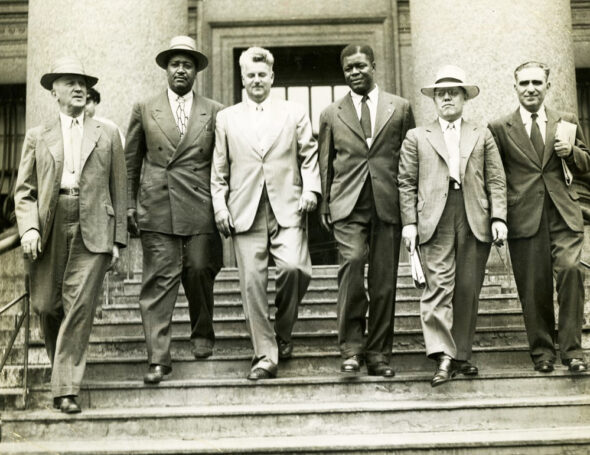
Our party has never been outlawed, though measures have been taken by the federal government to curtail its influence—by making party members register as foreign agents; generating mass lists of “Communist fronts,” leading to the dissolution of mass organizations; public Red-baiting; removing Communists from leadership in CIO unions; deporting Communists who were not U.S. citizens; and other repressive measures.
During the First Red Scare in 1919 and following years in which the U.S. government particularly targeted the Industrial Workers of the World (IWW), our party went underground as the “Workers Party” and was raided along with the Wobblies in the Palmer Raids. During the Second Red Scare in the 1950s, party leadership again went underground and destroyed their membership lists. At this time, COINTELPRO was targeting Communists for arrest, deportation, job loss, and ongoing harassment. The party survived this difficult period, but is still recovering from the political repression.
This recovery has been tough. The after-effects of FBI infiltration and repression can still be felt. Ideological splits and confusion generated by circumstances of the following period—the Sino-Soviet split, the Hungarian crisis, New Left movements emerging, the rise of Reaganism and Gorbachev’s leadership in the USSR, the fall of the USSR and subsequent split within the CPUSA—all continue to have their impact.
Removing every obstacle to recruiting immigrant workers
A large part of the U.S. working class consists of immigrant workers from Latin America, Africa, Asia, the Middle East, and elsewhere. Immigrants are a major and often progressive component of our working class. Many come to our country as refugees of war-ravaged countries under the gun of U.S. imperialism.
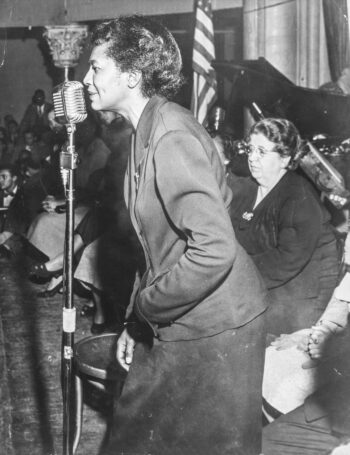 The CPUSA was founded, in part, by immigrant workers of different nationalities from Europe and later a large set of Afro-descendants from the Caribbean. Claudia Jones was a Trinidadian immigrant and a leader of the party’s women’s commission. Ferdinand Smith was a leading Jamaican national in the National Maritime Union. Both were deported under the McCarran and Smith Acts. During this period, Congress also passed discriminatory laws against immigrants seeking citizenship for being Communists or suspected Communists.
The CPUSA was founded, in part, by immigrant workers of different nationalities from Europe and later a large set of Afro-descendants from the Caribbean. Claudia Jones was a Trinidadian immigrant and a leader of the party’s women’s commission. Ferdinand Smith was a leading Jamaican national in the National Maritime Union. Both were deported under the McCarran and Smith Acts. During this period, Congress also passed discriminatory laws against immigrants seeking citizenship for being Communists or suspected Communists.
Fighting for the full legalization of the Party, therefore, is part and parcel of fighting for the full democratic rights of all immigrants to join the Communist Party without fear of retaliation—whether from the U.S. government, employers, landlords, or anyone else.
The party should incorporate the fight for immigrant rights into the work of building local NAARPR branches throughout the country. . The NAARPR is meant to be a mass defense organization, following the historic lineage of the Civil Rights Congress and the International Labor Defense. It aims to bring together legal experts, movement lawyers, and community organizers to both provide legal protection for vulnerable communities and to strengthen the fightback. NAARPR branches and other organizations around the country have been fighting against ICE and other immigration enforcement agencies, and for the expansion of the democratic rights of immigrants, including the right to vote in local elections, regardless of immigration status.
Communist Party on the ballot, a foundational legal struggle
“There is, first of all, the necessity of helping to establish that kind of a committee which will bring together Communists and non-communists on a national scale who will lead in the fight for the legality of the Communist Party, and organize the campaign to get the Party on the ballot. Such a battle will include the concept in many areas of urging civil libertarians and others to test the anti-Communist laws in the majority of states in the country.” — Henry Winston, The Politics of People’s Action
Fighting to get our party back on the ballot is a legal, democratic fight that needs to be prioritized as we continue to build our party in this new period. Utilizing united front approaches to working-class issues will assist our comrades in this fight.
If political parties like the Green Party and the Libertarian Party can have ballot access in most states, then why can’t we? What are the laws preventing us from doing so? If the Communist Party is to be part of the national life of the country, then we need to be seen nationwide on every county, district, state, and national ballot.
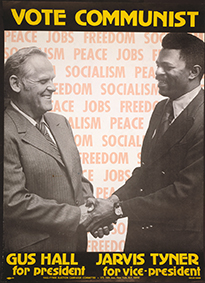 This is a difficult task and one that will not be accomplished overnight, but it is one that needs to be studied by each party district to see what strategic and tactical approach is realistic. Petitioning to get the Communist Party on the ballot will be a difficult task. Remaining on the ballot for following elections will be even more difficult, given existing electoral restrictions and our lack of financial resources as a working-class party, but if our comrades in Europe and elsewhere can fight for political power, then we should also be able to do so.
This is a difficult task and one that will not be accomplished overnight, but it is one that needs to be studied by each party district to see what strategic and tactical approach is realistic. Petitioning to get the Communist Party on the ballot will be a difficult task. Remaining on the ballot for following elections will be even more difficult, given existing electoral restrictions and our lack of financial resources as a working-class party, but if our comrades in Europe and elsewhere can fight for political power, then we should also be able to do so.
“The maximum of concentration and the mass exercise of ingenuity must be brought into play in defense of democracy”—Winston urged in The Politics of People’s Action—“which begins with the ballot rights of the Communists.”
This fight may begin at the local level by developing close working relationships with progressive forces operating under the Democratic Party umbrella. One example of this might be the Working Families Party, which works directly with progressives within the Democratic Party and also runs independent candidate slates in Pennsylvania and New York.
Building an electoral base of independent candidates for nonpartisan office may also be a route, like running candidates for Advisory Neighborhood Commissioner in Washington, DC.
However, we must be careful of opportunists. Frustration with the old two parties has led to the creation of a new “centrist” party headed by former presidential candidate Andrew Yang. Called the “Forward Party,” it is attracting technocratic fascists and right-wing libertarians. The “Movement for a People’s Party” is another opportunistic outfit, led by Jimmy Dore and other racist and sexist cult-like YouTubers, who are proponents of a certain brand of fascism that uses Marxist language.
Our goal is to build a mass movement with working-class leadership. To build left-center unity, leading to a progressive people’s party with mass influence, we will need to work within the trade union movement and unite all forces in the struggle against racism, the struggle for gender equality, and other mass democratic movements. It is a two-fold struggle: 1) building confidence within the working class to be independent of the two old parties and to begin to build a new, popular, anti-monopoly party and 2) building confidence in our own party to run its own independent candidates to put our own program forward into the national life of the country.
Let us not forget Communists like Si Gearson who received over 100,000 votes on the Communist city council ballot line in Brooklyn, NY; or Gus Hall, who in his 1980 presidential election campaign with Angela Davis received nearly 45,000 votes; or Elizabeth Gurley Flynn, who gathered over 50,000 votes in 1942 for Congress at-large. Over 600,000 people cast votes for Bernadette Doyle in 1950 for statewide Superintendent of Public Instruction in California. Jarvis Tyner received over 11,000 votes in 1978 for New York Governor. Over 33,000 people voted for Claude Lightfoot in 1933 for Illinois state legislature. And the list goes on.
Fighting for our popularity
The fight for the Communist Party’s popularity is an important fight and requires the confidence of our members. Fighting for its full legality will also increase party morale.
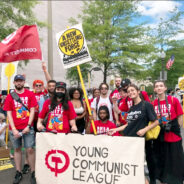 In the fight for popularity, we have to present ourselves in a professional and disciplined manner in every social, economic, and political sphere we find ourselves in and be confident enough to present our program publicly. This requires mass education within the party itself and a special role for clubs in developing a clearer understanding of the party’s program.
In the fight for popularity, we have to present ourselves in a professional and disciplined manner in every social, economic, and political sphere we find ourselves in and be confident enough to present our program publicly. This requires mass education within the party itself and a special role for clubs in developing a clearer understanding of the party’s program.
In the multimedia sphere, the party needs to present itself as a viable alternative to the two old parties and overcome the perception of it as a fringe political party.
Our confidence and morale will be shown to the masses of people through our work in the labor movement, in the oppressed communities, on the campuses, and elsewhere.
Our confidence and morale will be shown when the communities that we perform our work in put our party members in leadership positions, showing their desire to have our party represent them in legislative fights or in political office.
Our popularity will grow as we take the lead in political campaigns resulting in victories for these communities—whether they be campaigns around a particular issue, or a particular Communist candidate.
These results can come about through the fight for legality. It is a struggle we must take on.
The opinions of the author do not necessarily reflect the positions of the CPUSA.
Images: CPUSA contingent at June 18 Poor People’s Campaign rally in DC (CPUSA); William Z. Foster addresses a rally of packinghouse workers in Chicago, 1919 (People’s World); Henry Winston speaking at election rally, 1949 (CPUSA Facebook); Smith Act defendants at Foley Square (CPUSA Facebook); Claudia Jones speaking, Elizabeth Gurley Flynn seated (CPUSA Facebook); CPUSA campaign poster (Library of Congress); CPUSA and YCL members at the June 18 Poor People’s Campaign rally in DC (CPUSA)


 Join Now
Join Now